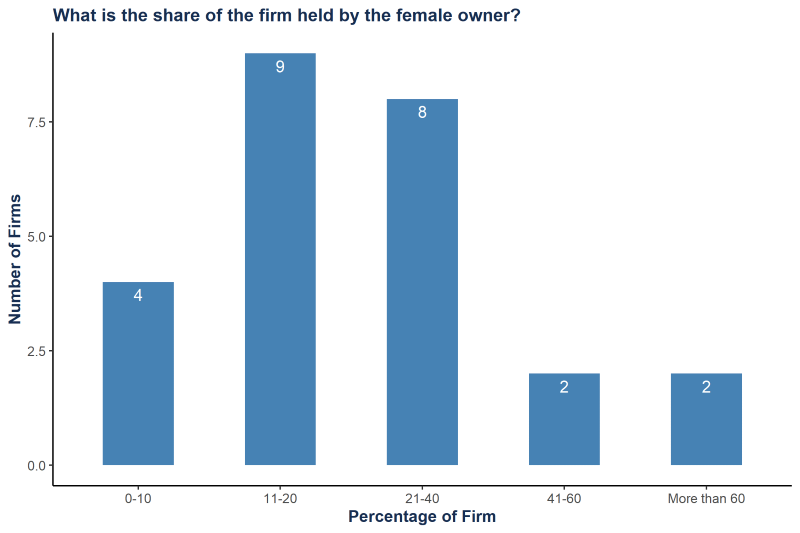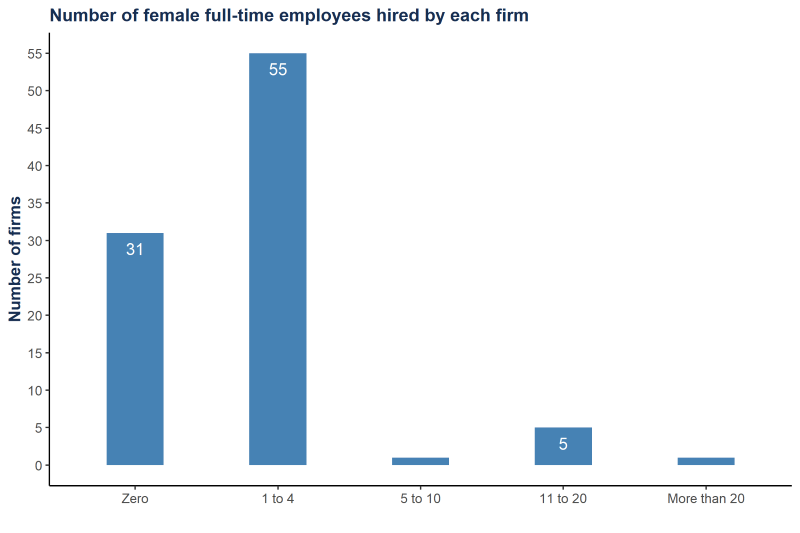Recommended
The participation of women in the Nigerian tech sector is low. In a survey of tech firms conducted by the ONE Campaign and the Center for Global Development, only about 30 percent were owned by women, mostly concentrated in e-commerce and enterprise solutions. Of women-owned firms, the median share of ownership is 20 percent. Tech firms do not employ many women either—31 firms in our sample employ no women at all. The median value is two female employees per firm.
Male dominance of the Nigerian tech sector is also revealed by the very small number of female top managers. Of the 93 tech firms surveyed, only six had a woman in a top management position.
What accounts for this imbalance? Our survey suggests that a mix of financial and other factors stand in the way of women’s equal representation in Nigeria’s tech sector. The good news is that the Nigerian government is taking steps that can help to address these barriers.
Female ownership in tech firms

Source: ONE-CGD Survey
Female employment in tech firms

Financial and non-financial barriers are higher for women
Access to finance is a significant constraint for small businesses in Nigeria, and especially for those owned by women. Because of the difficulty in assessing and managing risks associated with credit, banks are often reluctant to lend to small enterprises. This reluctance has translated into stringent screening measures and requirements by banks, which, in turn, discourage small and medium enterprises from applying. Lack of adequate collateral and difficult application procedures are often cited as major constraints by Nigerian tech firms seeking to obtain loans.
In our survey, about 60 percent of tech firms report access to credit as a major or severe obstacle. Respondents say they face a significant challenge in sourcing financial support to maintain or expand their operations. Female founders of start-ups are less likely to secure funding in comparison to their male counterparts. Odunayo Eweniyi, one of the founders of the fintech start-up PiggyBank, found that “local investors related better with men” when her company tried to raise money. She decided to stop attending investment meetings, leaving her two male co-founders to secure funding for the company.
Non-financial barriers are significant as well. Chika Nwobi of L5 Labs, a local venture capital fund, citing cultural restraints, admits: “I am unlikely to mentor a female tech entrepreneur because I am married.” He explained that cultural beliefs stopped him from developing professional relationships with female tech entrepreneurs because it could be easily misinterpreted. Research from other parts of the world has highlighted the fact that women who start businesses tend to have smaller networks than male entrepreneurs. Men have more social connections that enable them to access business opportunities, information, and contacts than do women. Women are disadvantaged from the start, having fewer professional connections, role models, and mentorship opportunities.
In a wide-ranging conversation, Chioma Agwuegbo, the founder of TechHer—a platform for knowledge exchange for women—told us that negative cultural stereotypes associated with female programmers (“glasses and no makeup”) compounded by ignorance ("long hours on a computer without any ‘tangible’ product”), may be reasons that fewer women enter the tech sector. Sometimes, it is the parents of a young woman who discourage her from a career in technology, as it is perceived to be less “feminine.”
The Nigerian government is taking steps to address disparities
While these financial and cultural barriers are real, they are not insurmountable. Several government initiatives hold promise for women in tech. A new report from the Federal Ministry of Women Affairs prepared for Beijing+25 (the 25th anniversary of the Beijing Declaration and Platform for Action aimed at advancing women’s rights) highlights the gender disparities in science education and computer literacy that need to be addressed. Among other things, it highlights the African Development Bank Assisted Skills Training and Vocational Education Project. The project helps the government to restructure vocational and technical education so that it meets the demand for skills in the private sector. The project is focused on selected science and technology colleges, teacher training institutes, nomadic nonformal vocational training centers, and women’s vocational training centers to improve their effectiveness. These institutions will serve as demonstration centers to promote nationwide reforms.
Other programs might help as well. The 1000 Girls in Training program seeks to create an ICT talent pool. Girls in ICT functions in partnership with two NGOs—Women in Technology in Nigeria and the Women’s Technology Empowerment Centre—to ensure that more girls choose careers in ICT. The focus is on providing training in the areas of animation, website development, blogging, software development, graphics design, games, and computer programming.
Support for women
TechHer is an organization that works to support female tech entrepreneurs and workers. On the first Friday of every month, TechHer holds a networking event for women. The discussions spans topics relevant to women in technology, such as careers available to women in technology beyond programming and web-development. Since June 2017, TechHer has reached over 500 women. A series of update modules designed for.
TechHer has run training programs for women on topics like cybersafety, cybersecurity, digital marketing, enterprise development, coding, and web-development. It has organized an intensive training course on coding and web development for women and got a digital platform host to gift 10 women with free hosting sites and domain names. It has also effectively used social media as a tool for advocacy campaigns, especially those that work to end violence against women.
A bill to end gender discrimination in Nigeria
The Gender and Equal Opportunities Bill, which previously struggled to get through the National Assembly but has since been reformulated, would also help to address many of the barriers to women’s fuller participation in Nigeria’ tech sector if enacted. The bill calls for the elimination of all forms of gender discrimination in Nigeria and asks all actors—both public and private—to “take all appropriate measures, including regulatory policy, fiscal and administrative measures, to ensure the full development and advancement of all persons, especially young women and girl children.” The bill recommends temporary special measures to accelerate “de facto equality of opportunity and treatment between men and women” and states that in the political and public sphere, “a minimum of 35 per cent of all offices, positions, or appointments is reserved for women.”
The bill contains powerful language for the elimination of discrimination in education and employment and for the elimination of discrimination on the grounds of marital status. Notably, the bill calls for the implementation of seven sets of rights for women—the right to work, the right to equal employment opportunities, the right to free choice of profession, the right to equal remuneration, the right to social security, the right to maternity leave, and the right to protection of health.
Nigeria’s tech sector is well on its way, but the government and the private sector must take steps to make sure that it benefits from the talents of its entire population. That includes women, who make up half of the labor force and have much to contribute to this newly emerging sector.
Disclaimer
CGD blog posts reflect the views of the authors, drawing on prior research and experience in their areas of expertise. CGD is a nonpartisan, independent organization and does not take institutional positions.
Image credit for social media/web: Center for Global Development






